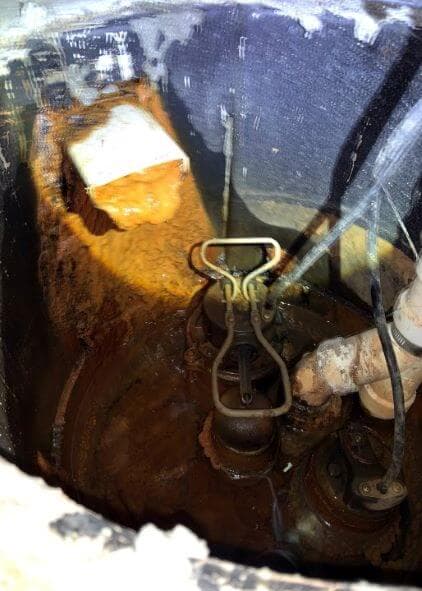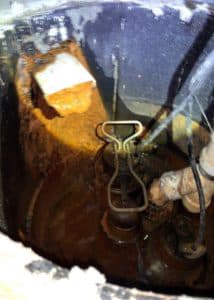
At some point in the last few years, making your own “slime” became a hobby for kids. There are kits sold in stores, along with many, many DIY recipes online. I’m too fussy (prissy is more accurate) to think this is anything but nasty. You’re welcome to disagree with me; even my youngest niece thinks glittery slime is awesome.
However, we can all agree that slimy orange ooze in your pipes IS nasty. And the first time you find it, you may panic; your family drinks that water! A quick google search will tell you that it’s not contaminating your water with anything harmful to people, but that doesn’t mean it’s not doing any damage to your house.
Acculevel is a family-owned and operated company that specializes in water drainage and foundation repair. We are not experts on water quality, but we do encounter iron ore bacteria and the issues it can cause in the waterproofing systems we install . Because we are focused on high quality customer service, we wanted to answer the questions our customers often ask about this topic.
Sometimes also referred to as “iron algae,” it’s a microorganism that feeds on iron (or manganese). These bacteria are common in groundwater and soil in areas across the Midwest. In our service area, they are most often found in parts of northern Indiana, Michigan, and Kentucky.
The major signs of iron ore bacteria are: an oily look or sheen on the water, strong unpleasant odors in the water, and a rusty-colored slime building up in your pipes, toilet tank, or on the inside walls sump pump pit. If you get your water from a well, you are more likely to have this bacteria. This is because it is extremely easy to contaminate a well with this bacteria during drilling, repairs, or maintenance.
Please keep in mind that because it’s easy to spread this bacteria, the locations that have this issue can be randomly placed. You may be the only house on your block, in your subdivision, or even your part of town.
 This photo was taken by an Acculevel project manager. Iron Ore Bacteria has clogged the water drainage and the installed sump pump.
This photo was taken by an Acculevel project manager. Iron Ore Bacteria has clogged the water drainage and the installed sump pump.
Not usually, no. Moderate levels of iron or manganese do not pose adverse health risks. It can make your water smell and taste unpleasant, but it doesn’t cause health problems. However, extremely high levels (0.3 mg/L) can be a health risk concern for infants. They should not be given water, nor should formula be made with water, that exceeds that limit.
Generally speaking, if your water does have a level that high, you’re going to be repulsed by it and not want to drink it. The smell and taste will be reminiscent of rotting plants or sewage.
Iron is generally considered to be more of an aesthetic problem, because it stains laundry and plumbing. But the byproducts of the iron ore bacteria can be a significant concern for the water management systems inside your home. As the bacteria grows, it creates the orange ooze (biofilm) that looks so awful. This biofilm collects and builds up until it can clog pipes and drains, including your water drainage system and sump pump.
If your water has a strong unpleasant taste or smell, but you don’t have any signs of orange sludge, please have your water tested by a professional lab. There are other bacteria and organisms that could be present, and some of those are toxic. I’ve included a link to the EPA website in the Additional Research section, if you need assistance locating a qualified lab.
There are a variety of methods of treatment, many of which can be performed by a DIY-inclined homeowner. If you need help managing or repairing a well, Indiana’s Department of Natural Resources maintains a list of licensed contractors for Indiana and the surrounding states.
Techniques to remove or reduce iron bacteria can include:
Something to remember: because this is a naturally occurring bacteria, treatments may be temporary and need to be repeated. The goal of treatment is limiting or controlling the bacteria, not eliminating it.
More than likely, the answer to that is “no.” Like Acculevel, most installation services only warranty the product and the quality of their installation. A clog created by bacteria is not something a drainage system can be designed to prevent.
However, there are things that can be done to help manage these clogs. If there are signs of iron bacteria in the home where we are contracted to install water drainage, we will modify the system to include ‘clean-out ports’ that give the customer access to their drainage. We would then recommend that they use these ports to administer water treatment to minimize the impact of the biofilm on their waterproofing.
Likewise, if there are no signs of the biofilm until after the system has been installed, we will repair or replace sections of the water drainage system. At that point, we would make the adjustments to also install the access ports for homeowner use. This happens occasionally; customers have no signs of iron ore bacteria in the groundwater, until after the ground is opened up and the water drainage installed. The drainage creates a space for the water to flow out of your home- but it sometimes also produces just enough oxygen to activate the dormant bacteria.
The EPA recommends annual testing for well water. This publication includes links to your state’s testing facilities, advice on how to proceed after a flood, and how to prevent or reduce contamination.
The Water Quality & Health Council has a number of resources to offer anyone with concerns about drinking water quality. Their article on keeping iron bacteria out of wells was an excellent source of information.
You should work with an experienced and reputable contractor, one who is insured and accredited by the Better Business Bureau.
If you are unsure about hiring a contractor to work on your home- in waterproofing, water management, or any other maintenance- we have a free downloadable checklist of Questions to Ask a Contractor. I highly recommend it (not because I wrote it!), but because it helps you screen potential contractors for red flags. No respectable company wants anyone to be cheated by a scam artist pretending to be a legitimate business.
[DISPLAY_ULTIMATE_SOCIAL_ICONS]